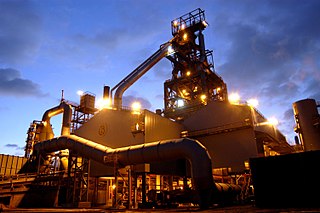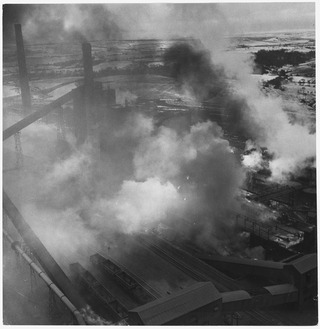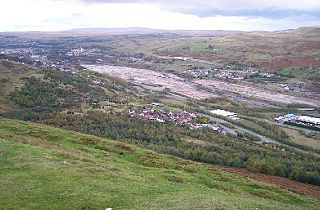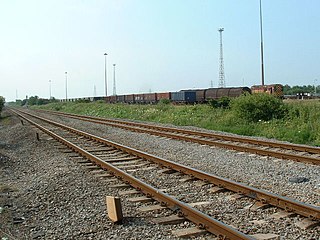Related Research Articles

British Steel was a major British steel producer. It originated from the nationalised British Steel Corporation (BSC), formed in 1967, which was privatised as a public limited company, British Steel plc, in 1988. It was once a constituent of the FTSE 100 Index. The company merged with Koninklijke Hoogovens to form Corus Group in 1999.

Briton Ferry is a town and community in the county borough of Neath Port Talbot, Wales. The Welsh name may indicate that the church, llan, is protected from the wind, awel. Alternatively, Sawel may be a derivative of Saul, St Paul's earlier name. He once landed at Briton Ferry. An alternative Welsh name unused today is Rhyd y Brython, a direct translation of Briton Ferry. The Normans referred to the River crossing as La Brittonne and Leland in 1540 as Britanne Fery.

Tata Steel Europe Ltd. was a steelmaking company headquartered in London, England, with its main operations in the United Kingdom and the Netherlands. The company was created in 2007, when Tata Group took over the British-Dutch Corus Group. In 2021, the company was split into a British and a Dutch branch. Tata Steel Netherlands (TSN) and Tata Steel UK fell directly under the Indian parent company Tata Steel and Tata Steel Europe ceased to exist.

Felindre is a rural village in southern Wales. Felindre is located in the far north of Swansea, in the electoral ward of Mawr.

The Brymbo Steel Works was a former large steelworks in the village of Brymbo near Wrexham, Wales. In operation between 1796 and 1990, it was significant on account of its founder, one of whose original blast furnace stacks remains on the site.

Port Talbot Steelworks is an integrated steel production plant in Port Talbot, West Glamorgan, Wales, capable of producing nearly 5 million tonnes of steel slab per annum. This makes it the larger of the two major steel plants in the UK and one of the largest in Europe. Over 4,000 people work at the plant. The majority of the slab is rolled on-site at Port Talbot and at the Newport Llanwern site to make a variety of steel strip products. The remainder is processed at other Tata Steel plants or sold in slab form. The works covers a large area of land which dominates the east of the town. Its two blast furnaces and steel production plant buildings are major landmarks visible from both the M4 motorway and the South Wales Main Line when passing through the town.
Pemberton is an area situated east of Llanelli in Carmarthenshire, Wales. It is part of the Llanelli Rural community bordering Llanelli and the villages of Cwmcarnhywel, Dafen, Cefncaeau and the outskirts of Llanelli town.

Machynys, or Machynys Peninsula is a coastal area just to the south of Llanelli in Carmarthenshire, Wales. In the nineteenth century an industrial community lived here working at the brickworks and tinplate works that occupied the site. When the industrial activity ceased in the mid-twentieth century, the buildings were demolished and the site lay derelict. It has now been redeveloped as a golf course as part of the Llanelli Waterside regeneration plan.

Thyssen was a major German steel producer founded by August Thyssen. The company merged with Friedrich Krupp AG Hoesch-Krupp to form ThyssenKrupp in 1999.
Richard Thomas and Baldwins Ltd (RTB) was a major iron, steel and tinplate producer, primarily based in Wales and formed in 1948 by the merger of Richard Thomas & Co Ltd with Baldwins Ltd. It was absorbed into British Steel Corporation in 1967. The business now forms part of Corus, a subsidiary of Tata Steel.

The Consett Iron Company Ltd was an industrial business based in the Consett area of County Durham in the United Kingdom. The company owned coal mines and limestone quarries, and manufactured iron and steel. It was registered on 4 April 1864 as successor to the Derwent & Consett Iron Company Ltd. This in turn was the successor to the Derwent Iron Company, founded in 1840.

The Ravenscraig steelworks, operated by Colvilles and from 1967 by British Steel Corporation, consisted of an integrated iron and steel works and a hot strip steel mill. They were located in Motherwell, North Lanarkshire, Scotland.

David Colville & Sons, a Scottish iron and steel company, was founded in 1871 and it opened its Dalzell Steel and Iron Works at Motherwell in 1872. By the first World War, it was the largest steel works in Scotland and it continued to expanded afterwards taking over a number of other steel works in Cambuslang and Glengarnock.

Ebbw Vale Steelworks was an integrated steel mill located in Ebbw Vale, South Wales. Developed from 1790, by the late 1930s it had become the largest steel mill in Europe. It was nationalised after World War II. As the steel industry changed to bulk handling, iron and steel making was ceased in the 1970s, and the site was redeveloped as a specialised tinplate works. It was closed by Corus in 2002, but is being redeveloped in a joint partnership between Blaenau Gwent Council and the Welsh Government.

Margam Knuckle Yard is a railway yard in Margam, South Wales, on the South Wales Main Line, operated by DB Schenker Rail (UK). The yard is the major freight yard of the region, handling all of the rail freight movements from Port Talbot Steelworks, and most of the railfreight traffic around South Wales.

The Melingriffith Tin Plate Works were post medieval tin and iron works located on Tŷ-mawr Road, in Whitchurch, Cardiff, Wales. Founded sometime before 1750, it was the largest tin-plate works in the world by the end of the 18th century. Subsequent to the closure of tin plate works in 1957, the 200-year-old Melingriffith water pump was named a scheduled monument. It is one of the earliest and most important works of its kind, and may be "the most notable surviving monument of the tinplate industry".

Trostre Steelworks is a tinplate manufacturing facility located in Pemberton, Carmarthenshire, just outside Llanelli, West Wales. Planned by the Steel Company of Wales in 1947, today it is part of Tata Steel Europe's infrastructure.
Skinningrove steelworks is a steel mill in Skinningrove, North Yorkshire, England. The business was formed in 1874 as the Loftus Iron Company, after a liquidation of the company reformed in 1880 as the Skinningrove Iron Company. The works expanded from producing only pig iron to include steel production in the early 20th century, with mills specialising in long products including railway rail. As part of the business the company constructed a jetty at Skinningrove, and owned an ironstone mine in Loftus.
The Carmarthenshire League is a football league in Carmarthenshire, West Wales, sitting at the fifth, sixth and seventh levels of the Welsh football league system.
Trostre Sports A.F.C. are a Welsh football club from Trostre, Carmarthenshire in West Wales. They currently play in the Carmarthenshire League Premier Division, and are the reigning divisional champions.